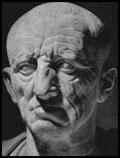Cato the Elder

Cato the Elder was born in Latium, near Rome in 234 BC. After spending his early years on his father's farm, he joined the Roman Army when he was seventeen.
Cato's army career took him all over the Roman Empire and while in Carthage he came across Mago's book on agriculture. He combined this information with his own experiences of farming to write On Agriculture.
Cato served in Africa, and took part in the crowning campaign of Battle of Zama (202). He held a command in Sardinia and Hispania.
A talented orator, became successively quaestor (204), aedile (199), praetor (198), and consul (195). Cato was a conservative politician who feared that foreign ideas would corrupt Roman society.
Cato the Elder died in 149 BC.
Primary Sources
(1) Cato the Elder, speech in the Roman Senate in 195 BC
Woman is a violent and uncontrolled animal... If you allow them to achieve complete equality with men, do you think they will be easier to live with? Not at all. Once they have achieved equality, they will be your masters.
(2) Cato the Elder, On Agriculture (c. 170 BC)
It is the cabbage which surpasses all other vegetables for medical value. It may be eaten either cooked or raw; if you eat it raw, dip it into vinegar. It promotes digestion and is an excellent laxative. If you wish to drink a lot at a banquet and enjoy your dinner, eat as much raw cabbage as you wish before dinner... Cabbage can be used as a poultice on all kinds of wounds and swellings; it will cleanse all sores and heal without pain; it will soften and open boils... Headache and eye ache it heals alike... Also if you feel sick, if the spleen is swollen, if the heart is painful, or the liver - in a word, it will cure all internal organs... And still further, if you save the urine of a person who eats a lot of cabbage, heat it, and bathe the patient in it... Also, if babies are bathed in this urine they will never be weakly.
